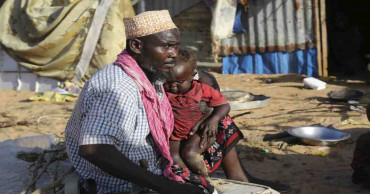Africa
Migrants evade Libyan coast guard to reach Europe
The February storm is unforgiving, violently shaking the humanitarian rescuers’ vessel as they try to revive a faulty engine and save African migrants drifting in the Mediterranean Sea after fleeing Libya on unseaworthy boats.
Ghana is first nation in world to receive COVAX vaccines
Ghana has become the first country in the world to receive vaccines acquired through the United Nations-backed COVAX initiative with a delivery Wednesday of 600,000 doses of the AstraZeneca vaccine made by the Serum Institute of India.
South Africa scraps AstraZeneca vaccine, will give J&J jabs
South Africa will give the unapproved Johnson & Johnson vaccine to its front-line health workers beginning next week as a study to see what protection it provides from COVID-19, particularly against the variant dominant there, the health minister said Wednesday.
Myanmar junta imposes curfew, meeting bans as protests swell
Myanmar’s new military rulers on Monday signaled their intention to crack down on opponents of their takeover, issuing decrees that effectively banned peaceful public protests in the country’s two biggest cities.
Death toll from violence in Sudan's West Darfur rises to 83
The death toll from tribal violence between Arabs and non-Arabs in Sudan’s West Darfur province climbed to at least 83, including women and children, a doctor’s union and aid worker said, as sporadic violence continued Sunday.
'Extreme urgent need': Starvation haunts Ethiopia's Tigray
From “emaciated” refugees to crops burned on the brink of harvest, starvation threatens the survivors of more than two months of fighting in Ethiopia’s Tigray region.
Another UN peacekeeper killed in Mali, 5th in a week
A United Nations peacekeeper from Egypt was killed in Mali’s northern Kidal region on Friday, and another was seriously injured, after their vehicle hit an explosive device during a logistics convoy, the U.N. said.
Security Council has critical role in addressing fragility, conflict: UN chief
UN Secretary-General António Guterres has underlined the critical role of the Security Council in addressing links between fragility and conflict, two of the greatest obstacles to achieving sustainable development across the world.
Jihadists in Niger kill at least 100 in mounting violence
More than 100 civilians were killed in Niger over the weekend by extremists who attacked two villages, as insurgent violence mounts in the West African nation.
In Somalia, COVID-19 vaccines are distant as virus spreads
As richer countries race to distribute COVID-19 vaccines, Somalia remains the rare place where much of the population hasn’t taken the coronavirus seriously. Some fear that’s proven to be deadlier than anyone knows.
.jpg)
.jpg)
.jpg)
.jpg)




.jpg)




